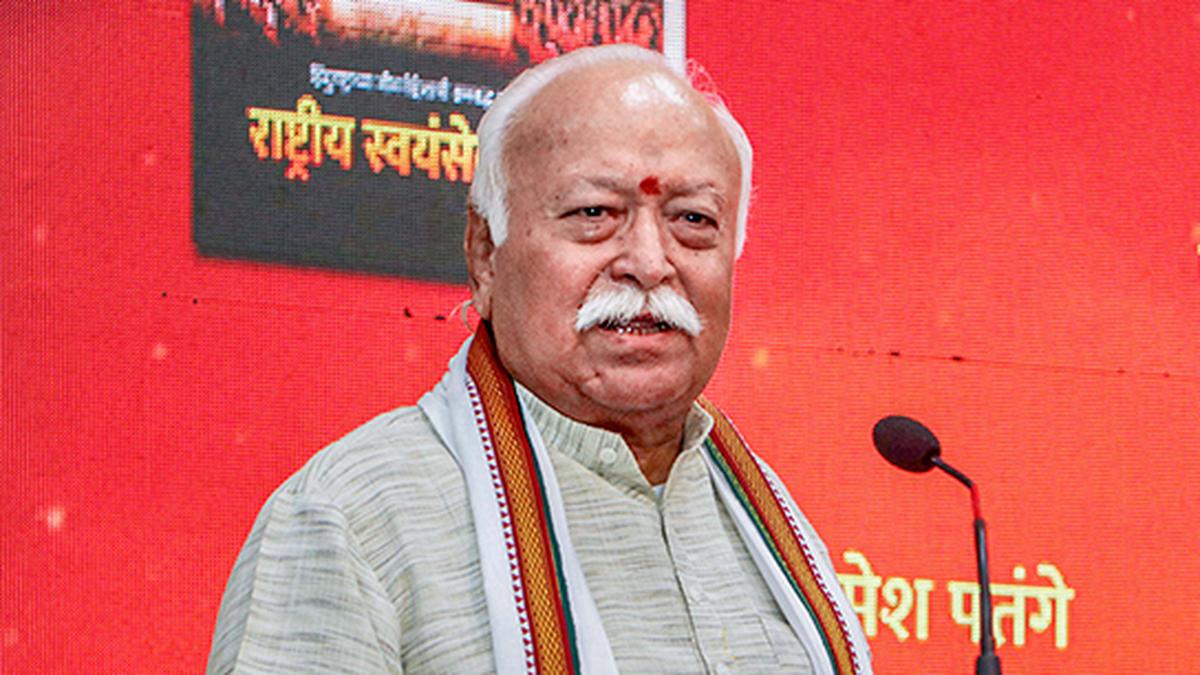
Ahilyabai Holkar, an ideal of what a ruler should be, says Mohan Bhagwat
The Hindu
RSS chief Mohan Bhagwat praises Ahilyabai Holkar as an ideal ruler, highlighting her progressive governance and contributions to society.
RSS chief Mohan Bhagwat on May 30 described the late Holkar queen of Indore, Ahilyabai Holkari, as the “ideal of what a ruler should be like”, in a message marking the 299th birth anniversary of the queen. The late queen was ruler of Indore for nearly three decades in the 18th century, after being widowed early in life, and was considered not only progressive but also contributed to greatly to the revival of the Kashi Vishwanath Temple and the Maheshwari weaving style.
“Even today, her character is ideal for us. Unfortunately, she became a widow early in life, but despite being a single woman, she not only managed her large kingdom, but also made it bigger, and not only made the kingdom bigger, but also ran it as a good governance. She is the ideal of what kind of ruler should be like,” Mr Bhagwat said in a video message.
Praising her contributions, Mr Bhagwat noted that she had built industries so that the people could get employment and built them so strong that the textile industry of Maheshwar was still running and providing employment to many people. “The word Punyashlok is behind her name. Punyashlok is the ruler who frees the people from all kinds of deprivations. She built industries so that the people could get employment and built them so strong that the textile industry of Maheshwar is still running and employs many people. She also cared for all the sections,” he said.
“She made the tax system of her kingdom well-organized. She cared for the farmers. Her kingdom was good in every way. Efforts to emulate her, to remember her will go on everywhere throughout the year, it is a matter of great joy,” he added.
Events to mark the beginning of the 300th anniversary of the late queen’s birth have been planned and will receive support from the RSS, sources said.

“Writing, in general, is a very solitary process,” says Yauvanika Chopra, Associate Director at The New India Foundation (NIF), which, earlier this year, announced the 12th edition of its NIF Book Fellowships for research and scholarship about Indian history after Independence. While authors, in general, are built for it, it can still get very lonely, says Chopra, pointing out that the fellowship’s community support is as valuable as the monetary benefits it offers. “There is a solid community of NIF fellows, trustees, language experts, jury members, all of whom are incredibly competent,” she says. “They really help make authors feel supported from manuscript to publication, so you never feel like you’re struggling through isolation.”

Several principals of government and private schools in Delhi on Tuesday said the Directorate of Education (DoE) circular from a day earlier, directing schools to conduct classes in ‘hybrid’ mode, had caused confusion regarding day-to-day operations as they did not know how many students would return to school from Wednesday and how would teachers instruct in two modes — online and in person — at once. The DoE circular on Monday had also stated that the option to “exercise online mode of education, wherever available, shall vest with the students and their guardians”. Several schoolteachers also expressed confusion regarding the DoE order. A government schoolteacher said he was unsure of how to cope with the resumption of physical classes, given that the order directing government offices to ensure that 50% of the employees work from home is still in place. On Monday, the Commission for Air Quality Management in the National Capital Region and Adjoining Areas (CAQM) had, on the orders of the Supreme Court, directed schools in Delhi-NCR to shift classes to the hybrid mode, following which the DoE had issued the circular. The court had urged the Centre’s pollution watchdog to consider restarting physical classes due to many students missing out on the mid-day meals and lacking the necessary means to attend classes online. The CAQM had, on November 20, asked schools in Delhi-NCR to shift to the online mode of teaching.









